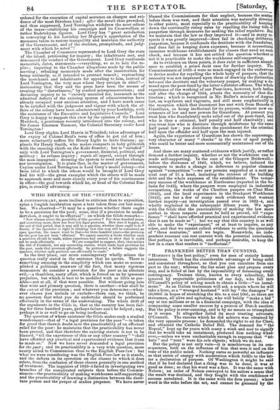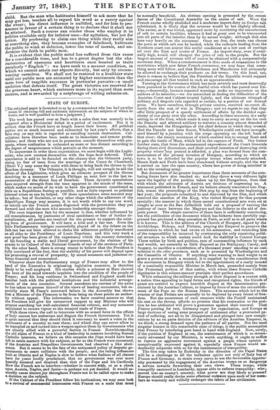FRANKNESS BETTER THAN CUNNING.
"HONESTY is the best policy," even for men of strictly honest intentions. Truth has the considerable advantage of being solid and consistent throughout, so that you can calculate from one part to the rest ; whereas the liar must plan and prepare every step, and is foiled at last by the impossibility of foreseeing every contingency. Truisms these, known to every schoolboy, but ignored by respectable politicians of our day, who fall into O'Connell's policy of asking much to obtain a little—"an instal- ment." As an Italian tradesman will ask a sequin where he will take a livre, as a " wronged husband" will lay "the damages " at 50,000/. in hopes of stretching the 40s. to a coo11001., so there are statesmen, all alive and agitating, who will boldly "make a bid" say at ten millions or so in a financial campaign, with the idea of compassing some smaller success by a process of Dutch auction. But the policy is over-cunning, and is by no means so triumphant as it seems. It altogether failed its most trusting advocate, O'Connell. The success which he did achieve was obtained by the very opposite process : he demanded the right to sit for Clare, and obtained the Catholic Relief Bill. The demand for "the Repeal," kept up for years with many a wink and nod to signify that he would take an instalment, produced him nothing what- ever,—unless we were uncharitable enough to suppose that " tzi- bute" and "rent" were his sole objects; which we do not. But the policy is not only vain—it is mischievous in its con- sequences, both on the influence of him that uses it and on the tone of the public mind. Nothing earns so powerful an influence as that union of energy with moderation which fulfils to the let- ter a declaration of purpose. Of Washington it might be said that if he had declared that a thing was to be done, it was as good as done ; so that his word was a fact. It was the same with Nelson ; an order of Nelson conveyed to his sailors a sense that the result was destined, and they fought with the confidence of success antedated. It is the same with the firm parent; whose word is the echo before the act, and cannot be gainsaid by the Child. But the man who habituates himself to ask more that he may get less, teaches all to regard his word as a surety against the event ; his direct influence is nullified, and for him to pro- nounce in favour of a certain thing is to declare that it shall not be attained. Such a course can render those who employ it in politics available only for inferior uses—for agitation, but not for action. By professing to claim one thing while they really aim at something else, they become examples of falsehood, habituate the public to wink at delusion, lower the tone of morals, and un- dermine the faith in public men.
It is evident that the public mind has suffered from this cause for a considerable time, and has to a great degree lost the cha- racteristics of openness and heartiness once boasted as traits peculiarly " English" : we have sunk to a meaner condition, in which we cannot attain our objects directly, but only by circum- venting ourselves. We shall not be restored to a healthier state until our public men are animated by higher sentiments than the mere love of tangible successes in particular pursuits—a small ambition that defeats itself. The great victories are reserved for the generous heart, which embraces more in its regard than mere success, and is rewarded by a surplusage of willing submission.



























 Previous page
Previous page